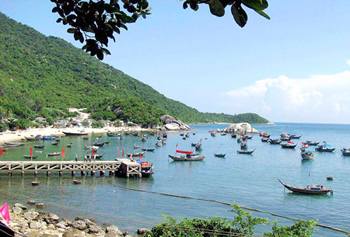
The central region of Vietnam has by far the most natural, diverse and rich ecosystem in the country despite its harsh weather conditions of a hot, dry and windy summer and severe floods during the rainy season.
Located at a height of 1,000-1,450 meters, Bach Ma ecotourism site in Phu Loc District of Thua Thien-Hue Province is well-known for its year-round co ol weather and diversified variety of flora and fauna.
The 37,500 hectare Bach Ma was recognized as a National Park in 1991. Scientists have so far identified over 2,000 species of plants, 132 of animals, 358 of birds, 894 of insects, 57 of fish and 52 reptiles and amphibian species.
Local authorities have developed the park in a unique manner so as to make it an ideal tourist spot that attracts both domestic and foreign visitors.
One hundred kilometers from Bach Ma National Park is Cu Lao Cham Island in Hoi An of Quang Nam Province. It comprises of eight islands naturally laid in a bow-shape on the Hoi An – Da Nang sea.
The 15 kilometer Cu Lao Cham stretch has an exquisite seascape and forest ecosystem with over 1,000 wildlife species including fishes, snails, seaweed and rare corals and over 500 plant species in the forests.
Many wild species on the island are listed in the Vietnam Red Book, like long-tailed macaques and swiftlets.
Cu Lao Cham was recognized as a World Biosphere Reserve by UNESCO in 2009.
Seventy kilometers from Cu Lao Cham is Phu Ninh Lake, a beautiful historical site in Nui Thanh District of Quang Nam Province.
The part natural and part manmade Phu Ninh Lake is the largest irrigation reservoir in the central region and second largest in Vietnam after Dau Tieng Lake in the southern province of Tay Ninh.
Phu Ninh Lake was built in 1986 covering over 3,400 hectares and containing over 344 million cubic meters of water. Each year it provides water to 23.000ha of farmland covering half of Quang Nam.
Article courtesy of saigon-gpdaily.com.vn

